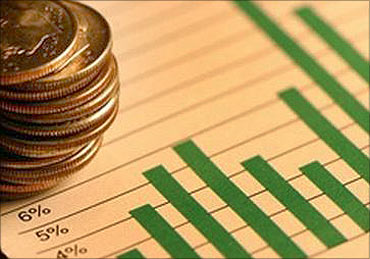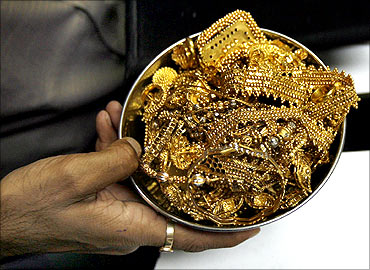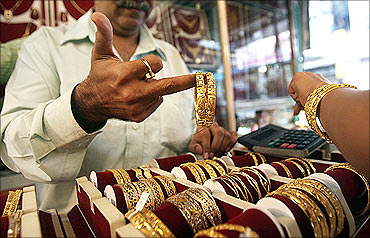 | « Back to article | Print this article |
Now, a novel way to buy and sell gold
Traditionally Indians purchase gold on all the conceivable occasions, be it Diwali, marriage in the family, or receipt of annual bonus. We generally purchase gold in physical form, be in the form of coins or jewellery. You can either purchase the gold in physical form or in electronic form.
'e-Gold' launched by National Spot Exchange Limited (You read it right not the National Stock Exchange) has the ideal combination of both the forms -- physical and electronic.
How does e-Gold work?
Since e-Gold can only be purchased in electronic form, you need to have a demat account. The existing demat account which you are using for transacting in shares etc. does not work for holding e-Gold units.
Hence, you need to open a separate demat account with one of the depository participant empanelled with the National Spot Exchange Limited. The list of such depository participants can be downloaded from the web site of National Spot Exchange http://www.nationalspotexchange.com/EmpanelledDPs.pdf.
The author is CFO, Apnapaisa.com.
![]()
Apnapaisa is a price comparison engine that allows consumers in India the ability to compare the EMI, , interest rates and other fees for home loans , car loans , personal loans , business loans , credit cards , compare online quotes and features of life insurance , health insurance , car insurance , travel insurance and other general insurance policies in India.
E-Gold: The new, safe way to invest in gold
In addition to having a demat account with one of the Depository Participant (DP) empanelled with NSEL for keeping your e-Gold units, you also need to have a client's account with any member of the NSEL.
Based on my interaction with the exchange, there are more than 300 trading members empanelled with NSEL, spread across length and breadth of the country. These are spread to small cities like Rajkot, Patna, Lucknow, Vijayawada, Jaipur, Jodhpur, Bhopal, Indore.
The latest version of list of such members is available and can be downloaded from the link http://www.nationalspotexchange.com/Memberslist_DP.pdf.
Trading in e-Gold can be done from Monday to Friday between 10 am to 11.30 pm.
The purchases can be made either by making a phone call to the broker member with whom you have opened your client account or through online trading access provided to you by the broker member, during the business hours indicated above.
E-Gold: The new, safe way to invest in gold
Costs involved
The purchase of e-Gold has transaction cost implications. The broker will charge you brokerage for purchase or sale of the e-Gold units.
This varies between 0.25 per cent to 0.5 per cent like brokerage charged by your share broker for purchase or sale of shares. In addition to the above broker will recover transaction cost at Rs 20 per lakh, which is charged by the exchange.
In addition to above you have to pay a very small amount for each transaction of sale of units in electronic form to the depository participant.
Apart from the transaction costs, you have to pay your depository participant, where you have your demat account, an annual maintenance charges of around Rs 300 per annum. Earlier the exchange used to charge for recovering the costs involved in storing the Gold in safe deposit vaults.
However the same has since been discontinued. You are allowed to do trading in the e-Gold units during the day but all the outstanding position at the end of the day should result into delivery or payment.
The delivery and payment mechanism in respect of e-Gold is similar to that of stock exchanges. In case of short delivery etc. there is an auction mechanism, the way it is conducted in BSE and NSE.
E-Gold: The new, safe way to invest in gold
Conversion of e-Gold into physical gold
All the units of e-Gold issued by the exchange are backed by equal quantity of gold in its vaults.
Like your bank where you can always request your bank to give you money in currency notes equal to amount lying in your bank account, in case of e-Gold units also you can request the exchange to give you physical gold equal to e-Gold units lying in your demat account.
For converting your electronic units into physical units you have to surrender the electronic units with a request for physical gold. You have the option to take the delivery of the physical gold at any place where NSEL has delivery centres.
Presently the exchange has delivery centers in Mumbai, Delhi, and Ahmedabad.
The exchange presently offers the option of exchanging your e-Gold units into coins/bars of 8, 10, 100 gram and 1 kilogram and any combination thereof.
The exchange, levies an amount of Rs 200 each for conversion of 8 gram and 10 gram coins. For 100 gram coins such conversion charges for making and packing is Rs 100.
For one-kilogram bar, the exchange does not charge anything. In addition to the above charges, you will have to pay VAT @ 1 per cent across the country and Octroi for conversion of electronic units into physical coins.
Octroi applicable in case of Mumbai is 0.1 per cent. For each case of delivery, you will have to pay Rs 200 for delivery charges, irrespective the quantity of the delivery desired. The depository will also charge you Rs 50 per such request.
Since Rs 250 is the fixed cost for each request for physical delivery of gold, it makes sense to let the units accumulate and take delivery in economic lots. Please note that these charges are levied only when the physical delivery is taken. In case the e-Gold units are sold in electronic form, these charges are not applicable.
E-Gold: The new, safe way to invest in gold
Tax treatment
The e-Gold units will be treated as Gold for tax purposes. The units should be held for more than 36 months for availing the confessional tax treatment accorded to long term capital gains and for exemption eligibility under Section 54 F or 54 EC of Income Tax Act, 1956.
You will also have to pay wealth tax on the market value of the electronic units lying in your account as on March 31 of each year, if the total value of your taxable wealth together with market value of e-Gold exceeds Rs 30 lakh.
Benefits of e-Gold
- Since the NSEL operates on a pan India basis, the price quoted for e-Gold is same across India. This eliminates the price bias due to geographical reasons. The e-Gold units have twin character of physical assets as well as financial assets and can be liquidated like your shares. So you can have liquidity at your will.
- In case of e-Gold units, the difference between the net selling price and purchase cost is as low as Rs 10 per gram whereas the same difference in case of physical gold is quite higher. This ensures higher returns if the e-Gold units are purchased and held as investment. Moreover since the gold is held in electronic form, you save on locker charges and do not have to worry about theft and robbery of the gold.
- In case you decide to take physical gold, you are given physical gold duly certified which takes care of purity concerns.
- Since the price quoted is transparent, it ensures efficient price discovery for purchase and sale, which is not the case if you are holding the gold in physical form. Moreover it is not so easy to sell your physical gold as is the case with E-Gold, which you can do by a click.
- e-Gold has converted a physical asset into a financial asset. Now with e-Gold you can very conveniently implement the concept of assets allocation and periodically rebalance your portfolio among different asset class like equity, debt and bullion as the cost of transaction is low.
- e-Gold also offers you the opportunity to accumulate gold in over a long period for your social obligation in very small quantities at very economical prices.
I feel e-Gold in due course will change the way people invest in gold in the long run and hold their gold.




